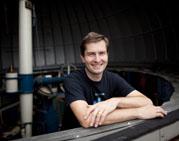Harvard Professor David Charbonneau Wins Fannie Cox Prize for Excellence in Science Teaching

Harvard University Dean of Science Jeremy Bloxham has announced that Professor David Charbonneau is one of two recipients of Harvard's 2011 Fannie Cox Prize for Excellence in Science Teaching. Consisting of a $10,000 personal award and $40,000 in unrestricted support for teaching and research, the Fannie Cox Prize for Excellence in Science Teaching recognizes outstanding teaching in introductory science courses.
Dean Bloxham noted, "David Charbonneau has revitalized the undergraduate study of astronomy and astrophysics and received rave reviews for his teaching of the introductory astronomy course. Charbonneau is also credited with increasing the number of concentrators in the Department of Astronomy and working to attract a more diverse group of students to the study of astronomy." Charbonneau has served as the Director of Undergraduate Studies in Astrophysics since 2008.
Charbonneau joined the Harvard astronomy faculty in 2004 and was the Thomas D. Cabot Associate Professor of Astronomy from 2007-2009. He holds an undergraduate degree in Math, Physics and Astronomy from the University of Toronto, and his A.M. and Ph.D. from Harvard University.
A member of the Solar, Stellar and Planetary Sciences Division of the Harvard-Smithsonian Center for Astrophysics, Professor Charbonneau's research interests lie in detecting and characterizing planets orbiting nearby stars. He is the Principal Investigator of the MEarth Project to Detect Habitable SuperEarth Exoplanets and is a Participating Scientist with NASA's Kepler Mission. He also serves as Deputy Principal Investigator for the Extrasolar Planet Observation and Characterization project of NASA's EPOXI mission. Among his other recent awards, Professor Charbonneau received the Alan T. Waterman Award from the National Science Foundation in 2009 and was named Scientist of the Year by Discover Magazine in 2007.